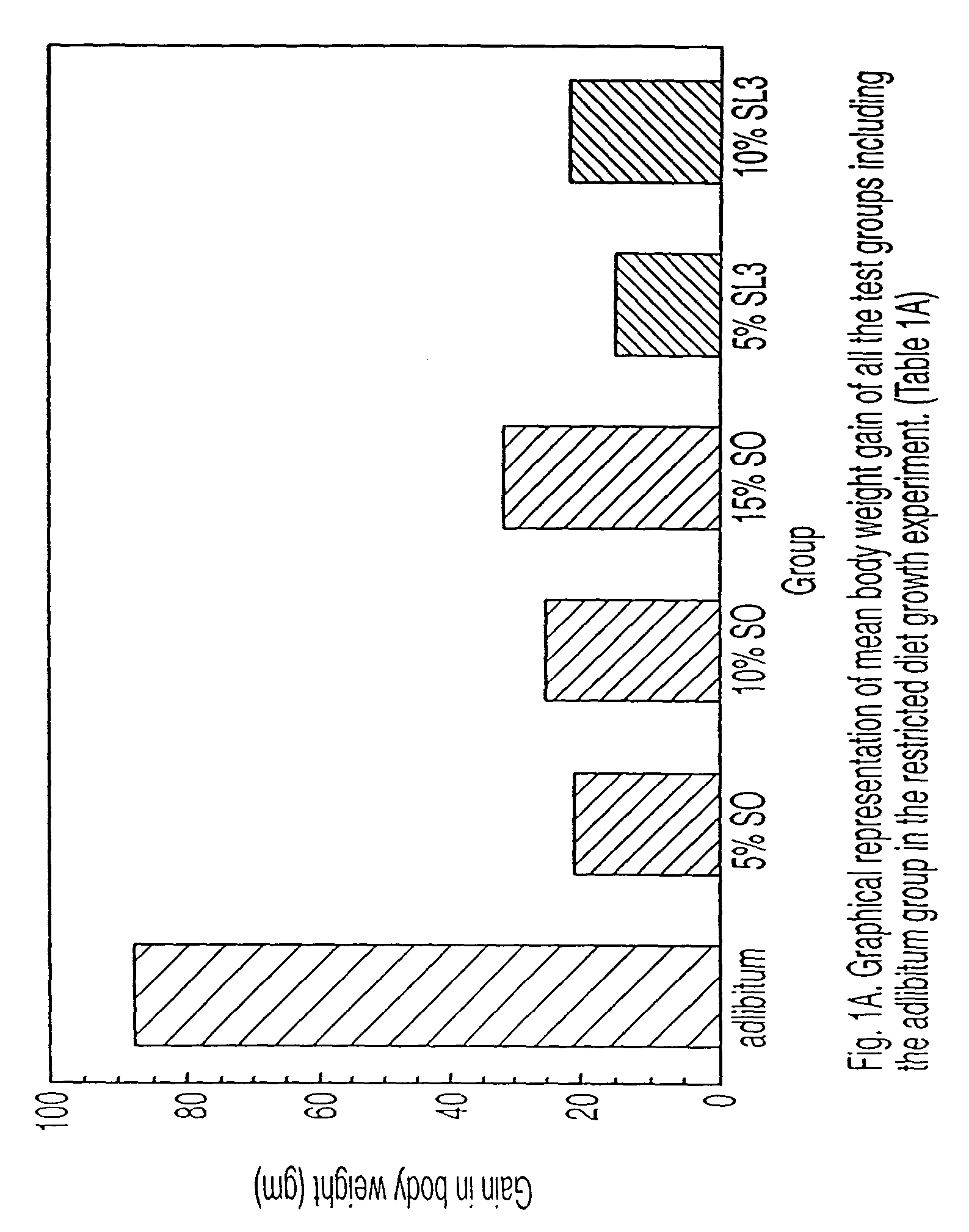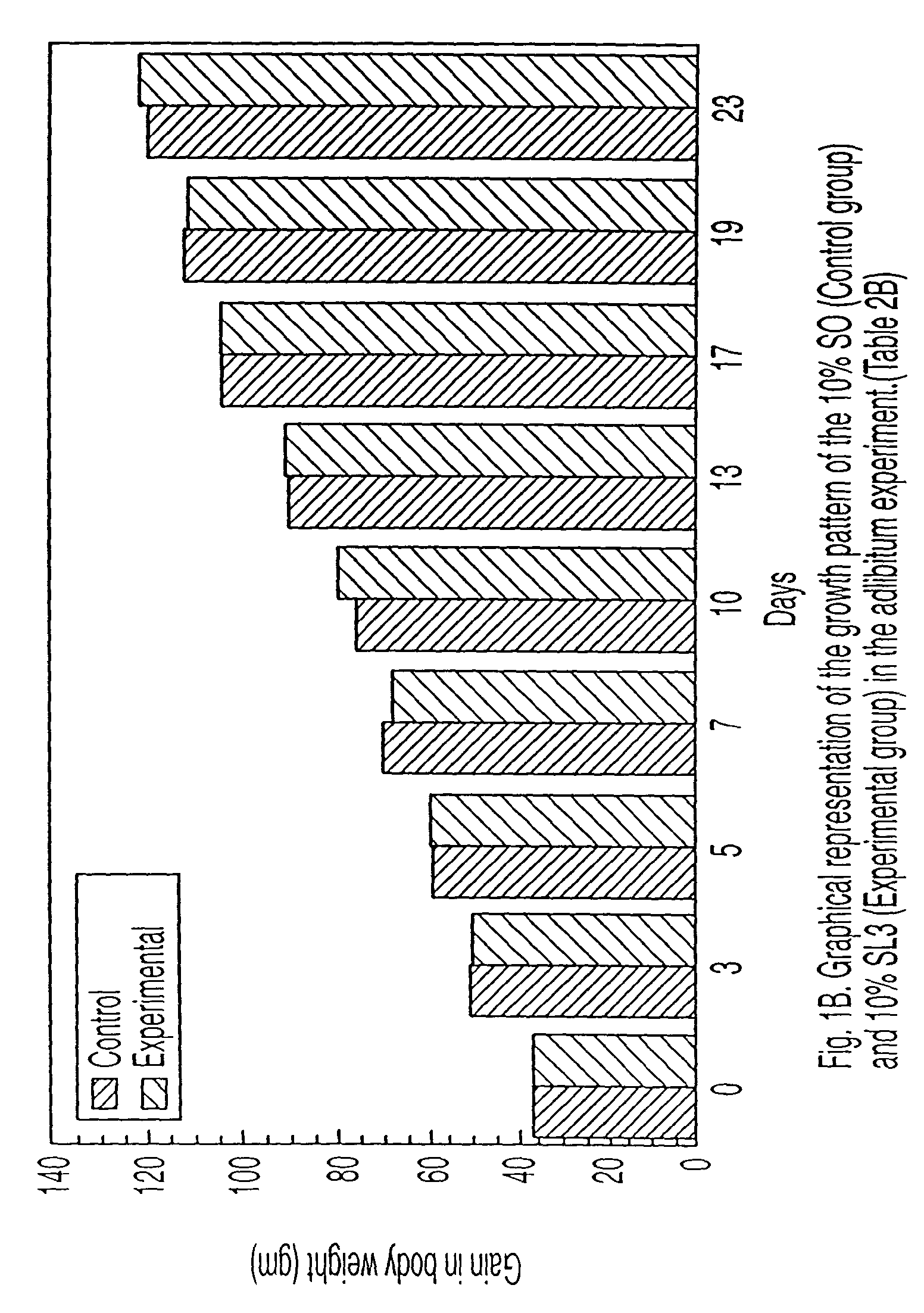Reduced-calorie fats containing behenic acid and process of making thereof
a technology behenic acid, which is applied in the field of process for the preparation of reduced calorie fats, can solve the problems of high difficulty in changing food habits, and impaired absorption of these vitamins at very low fat intakes, so as to achieve the effect of lowering the level of fat in the diet of affluent societies
- Summary
- Abstract
- Description
- Claims
- Application Information
AI Technical Summary
Problems solved by technology
Method used
Image
Examples
example 1
a) Preparation of 1,3-dibehenin
[0027]Mustard oil (100 gm) was mixed with tert-butanol (50 ml) and lipase from Candida cylindracea (700 mg) was added in small portions while stirring continuously. After the enzyme was dispersed uniformly, water was added intermittently at a rate of 3 ml / hr by a peristaltic pump for 2 h and stirred afterwards for an additional 12 hours. The mixture was centrifuged to separate the lipase. The reaction product had an acid value of 55.0. The solvent was removed under vacuum and the product dissolved in 300 ml of acetone and crystallized at 10C to yield dierucin (29 gm; colorless powder, m. pt. 45C). 1,3-dierucin was then hydrogenated using 10% Pd-C (1.5 gm) in chloroform (100 ml) at 2 kg / cm2 hydrogen pressure for 4 hours. Catalyst was filtered off and 1,3-dibehenin was crystallized by adding acetone (50 ml) and then cooling at 0C. Crystallized 1,3-dibehenin (24 gm; white flakes; m. pt. 88C) shows 92% behenic acid by Gas Chromatographic (GC) analysis.
b) I...
example 2
[0029]Sunflower oil (1 g) was mixed with 110° C. 1,3-dibehenin (0.842 g) in a two-necked 25 ml of R.B. flask and kept under vacuum at 110° C. for 30 minutes. Then sodium methoxide in methanol (0.5% w / w; 55 μl.) was added and stirred for 1 hour under vacuum. The product was taken in 20 ml of diethylether and washed with water to remove sodium methoxide. The reduced calorie fat containing behenic acid was purified by silicic acid column chromatography using hexane:ethyl acetate (95:5, v / v) as eluant and found to contain behenic acid, 52.5%; oleic acid, 13.1%; linoleic acid, 24.8% and others, 9.6%. The yield of the reduced-calorie fat was 1.0 g and its slip melting point was found to be 50° C.
example 3
[0030]Sunflower oil (5 g) was saponified by refluxing with 10% potassium hydroxide in ethanol (20 ml) for one hour. The saponified mass was neutralised with dil. hydrochloric acid and extracted with diethylether to obtain sunflower oil fatty acids (4.5 g). The fatty acid mixture (4.5 g) was converted to anhydride by treating it with dicyclohexylcarbodiimide (4.24 g) in carbon tetrachloride (30 ml) for overnight. The precipitated dicyclohexyl urea was filtered out and filtrate was concentrated to obtain fatty acid anhydride (4.1 g). The anhydride (4.1 g) was then refluxed with 1,3-dibehenin (5 g) in 50 ml chloroform for 10 hours in presence of N,N-dimethylaminopyridine (1.2 g). The resulting structured fat having behenic acid in 1,3 position and sunflower oil fatty acids in 2 position was purified by silicic acid column chromatography by eluting with hexane:ethyl acetate (95:5; v / v). An yield of 6 g of structured fat (melting point 55° C.) was obtained with fatty acid composition of ...
PUM
 Login to View More
Login to View More Abstract
Description
Claims
Application Information
 Login to View More
Login to View More - R&D
- Intellectual Property
- Life Sciences
- Materials
- Tech Scout
- Unparalleled Data Quality
- Higher Quality Content
- 60% Fewer Hallucinations
Browse by: Latest US Patents, China's latest patents, Technical Efficacy Thesaurus, Application Domain, Technology Topic, Popular Technical Reports.
© 2025 PatSnap. All rights reserved.Legal|Privacy policy|Modern Slavery Act Transparency Statement|Sitemap|About US| Contact US: help@patsnap.com



